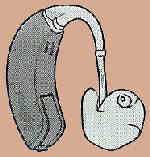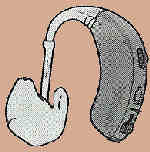|
 Hearing
Aids
Hearing
Aids

I am not even close to being an
expert on hearing aids, but I
have gone from "all-in-the-ear"
to "behind-the-ear" to "digital
behind-the-ear" aids; so I know
that those three are available.
I would like to point out
something that I learned the
hard way with my first hearing
aid. The first audiologist
suggested putting a hearing aid
in the ear that tested to be the "worst." All I got was
amplified "noise" and just
finally quit wearing it.
At the insistence of my mother,
I visited another specialist in
Lexington, Kentucky who showed
me that his test revealed that I
was understanding more words
when he amplified the "good
ear." Thus my first
successful experience with the
all-in-ear hearing aid in my
better-hearing ear.

They don't restore "natural
hearing," and anyone expecting
that will soon give up on
wearing their aids. It
requires some adjustments.
Your voice sounds "funny" and
some sounds are too loud, but
with persistence and patience it
soon becomes "natural" to the
wearer of a hearing aid as you
learn to make necessary
adjustments.

As time went on, my hearing
continued to deteriorate and I
began wearing two behind-the-ear
aids (more powerful than
all-in-the-ear).
Eventually the hearing loss
became so severe that I am now
wearing digital aids.
Unfortunately, I have very
little natural hearing and have
to rely on speech-reading as
much as sound. The article
I began this feature with (Will
You Help Me Hear You) could
have been written by me (not nearly
as well, of course!), because I
can identify with everything Mr.
Kennedy wrote.

Only those who are trained to do
audio testing can help you
determine what will benefit you
most, but may I encourage anyone
who is not hearing "up to par"
to be tested. Don't be
backward or embarrassed to wear
a hearing aid. People
don't feel shy about wearing eyeglasses when they need them,
and they should feel the same
way about hearing aids. We
who are hearing impaired have
lots of company!

When you first notice you are
not hearing well, you need to be
evaluated by an Otologist
(Otolaryngologist or
Otorhinolaryngologist) who can
determine the cause. It
could be some other health
problem. His evaluation
can help determine if the
problem is treatable before a
hearing instrument is purchased.
You will receive a report of his
findings that will assist the
audiologist in his testing to
learn what instrument will serve
you best.
In most cases you will have a
trial period to decide if you
wish to buy the aid. You
might be charged a fee that will
be credited toward the purchase
price if you buy it. Some
dispensers will give you thirty
days of trial.

An ear mold will be made to
custom fit your ear. Don't
hesitate to complain if it is
not comfortable. If it
hurts your ear, you won't wear
it!
Wearing an ear mold may
accelerate your "ear wax"
(cerumen). It was "normal"
for me, but everyone is
different. Some folks may
find they are allergic to the
mold material and may have to
have a non-allergic material
used. In short, do
everything possible to make the
experience as comfortable as
possible so you will be able to
wear your hearing aids and enjoy
the improvement they will bring
to your life.

Do your homework before you see
the specialists who can help you
choose what is best for you.
There are web sites and
information available, so take
advantage of it. Don't
wait! If in doubt about
your need, settle it by seeing a
specialist!

A special note--When
conversing with a hearing
impaired person wearing a
hearing aid, please don't shout
at them. That's why they
wear the hearing aid, to
increase the volume of sounds.
If you raise your voice more
than normal, it will only cause
the sound of your voice to
become distorted. Of
course whispers are hard to
follow, but normal volume will
assist the hearing impaired
person to understand you better.
Just speak distinctly and not
too fast; and don't change the
subject abruptly without
warning.
|